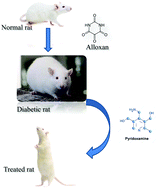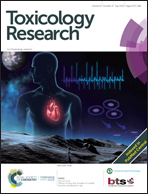Anti-diabetic study of vitamin B6 on hyperglycaemia induced protein carbonylation, DNA damage and ROS production in alloxan induced diabetic rats
Abstract
Oxidative stress performs an imperative role in the onset and progression of diabetes. Metabolic enzymes and cellular organelles are detrimental to increased levels of free radicals and the subsequent reduction in anti-oxidant defence. Pyridoxamine (vitamin B6) is an indispensible nutrient for humans and is considered to be an important food additive too. The aim of this research was to examine the effect of vitamin B6 in a diabetic environment. This study reports the effects of pyridoxamine supplementation in alloxan induced diabetic rats. Diabetes was induced by the single intra peritoneal dose of alloxan (120 mg per kg body weight). Diabetic rats were treated with pyridoxamine (10 and 15 mg per kg body weight) and compared with a control set of diabetic rats without supplementation. Pyridoxamine treatment showed dose dependent recovery in all parameters. A notable decline in oxidative stress parameters and ROS production with reductions in fasting blood glucose levels along with normal patterns of the glucose tolerance test has been reported here. Histological studies reveal damage recovery in the liver as well as kidney tissues. A notable amount of recovery was observed in cellular DNA distortion and damage. It is thus advocated that pyridoxamine might help in reducing problems associated with diabetes. A probable mechanism pertaining to the action of pyridoxamine is proposed as well.



 Please wait while we load your content...
Please wait while we load your content...